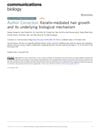 July 2023 in “The Egyptian Journal of Hospital Medicine ”
July 2023 in “The Egyptian Journal of Hospital Medicine ” Alopecia areata is a hair loss condition caused by immune factors and can be treated with JAK inhibitors.
3 citations,
July 2023 in “International journal of molecular sciences” Stress may contribute to hair loss in alopecia areata by affecting immune responses and cell death in hair follicles.
 24 citations,
June 2018 in “Reviews in endocrine and metabolic disorders”
24 citations,
June 2018 in “Reviews in endocrine and metabolic disorders” Thyroid diseases may contribute to autoimmune skin diseases, and more research is needed on their relationship.
[object Object]  April 2024 in “International journal of women's health”
April 2024 in “International journal of women's health” Adult female acne is a complex condition that can worsen with menopause, requiring holistic treatment and tailored skincare at different life stages.
 1 citations,
September 2023 in “Dermatology and therapy”
1 citations,
September 2023 in “Dermatology and therapy” More research is needed to find the best treatment for dissecting cellulitis of the scalp.
 16 citations,
October 2020 in “Lipids in Health and Disease”
16 citations,
October 2020 in “Lipids in Health and Disease” Leptin affects skin and hair health and may worsen some skin conditions, but more research is needed to understand its full impact.
 3 citations,
March 2021 in “Clinical, Cosmetic and Investigational Dermatology”
3 citations,
March 2021 in “Clinical, Cosmetic and Investigational Dermatology” Early treatment of Lupus Erythematosus Alopecia can prevent permanent hair loss, and various medications are effective.
 95 citations,
February 2018 in “Dermatology and Therapy”
95 citations,
February 2018 in “Dermatology and Therapy” Nutraceuticals may improve skin health and protect against aging, but more research is needed on their optimal use and possible health risks.
134 citations,
July 2020 in “Experimental dermatology” Hair follicles are normally protected from the immune system, but when this protection fails, it can cause hair loss in alopecia areata.
 February 2014 in “Journal of The American Academy of Dermatology” 1 citations,
May 2024 in “International Journal of Molecular Sciences”
February 2014 in “Journal of The American Academy of Dermatology” 1 citations,
May 2024 in “International Journal of Molecular Sciences” Adenosine receptors could be promising targets for treating inflammatory skin diseases like psoriasis.
January 2024 in “Diagnostics” Long COVID causes a wide range of long-lasting symptoms that change over time and are hard to diagnose and treat.
12 citations,
June 2023 in “International Journal of Molecular Sciences” Innovative biomaterials show promise in healing chronic diabetic foot ulcers.
 June 2023 in “Pharmaceuticals”
June 2023 in “Pharmaceuticals” Men and women respond differently to drugs for COVID-19, high cholesterol, and diabetes, which suggests a need for personalized treatments.
January 2024 in “Medicina” Statins may help treat PCOS by lowering androgen levels and improving cholesterol.
 March 2023 in “Clinical, cosmetic and investigational dermatology”
March 2023 in “Clinical, cosmetic and investigational dermatology” IL-33 is linked to hair follicle damage in psoriasis and could be a treatment target for hair loss in this condition.
 March 2021 in “bioRxiv (Cold Spring Harbor Laboratory)”
March 2021 in “bioRxiv (Cold Spring Harbor Laboratory)” A specific immune response helps control mite populations on the skin, maintaining healthy hair follicles.
 120 citations,
July 2005 in “Dermatologic surgery”
120 citations,
July 2005 in “Dermatologic surgery” Niacinamide improves aging skin and is safe for use in cosmetics.
 56 citations,
January 2019 in “Lancet”
56 citations,
January 2019 in “Lancet” JAK inhibitors help regrow hair in alopecia areata patients, improving their quality of life.
 August 2024 in “Cell Death and Disease”
August 2024 in “Cell Death and Disease” Activating TLR9 helps heal wounds and regrow hair by using specific immune cells.
 December 2023 in “International journal of multidisciplinary research and analysis”
December 2023 in “International journal of multidisciplinary research and analysis” SH-MSCs gel reduced IL-6 and increased TGF-β, suggesting it could treat alopecia.
 12 citations,
December 2017 in “Food and chemical toxicology”
12 citations,
December 2017 in “Food and chemical toxicology” Permanent hair dye mixtures can irritate and damage the skin.
2 citations,
December 2020 in “Developmental cell” Chemotherapy drugs can cause abnormal growth and changes in healthy skin and gland cells.
 20 citations,
December 2013 in “Journal of Dermatology”
20 citations,
December 2013 in “Journal of Dermatology” UV-B light increases inflammation-related substances in acne-related skin cells.
1 citations,
December 2021 in “American Journal of Obstetrics and Gynecology” Hair cortisol levels peak in the third trimester and decline postpartum.
 11 citations,
March 2013 in “Gene”
11 citations,
March 2013 in “Gene” A certain genetic variation in the IL1A gene may lower the risk of a hair loss condition in Chinese people.
 December 2022 in “Communications biology”
December 2022 in “Communications biology”  December 2022 in “Communications biology” [object Object] 56 citations,
September 2016 in “Pharmaceutical Research”
December 2022 in “Communications biology” [object Object] 56 citations,
September 2016 in “Pharmaceutical Research” The fish oil-based gel with imiquimod improves skin cancer treatment and reduces inflammation.
 3 citations,
March 2021 in “JAAD case reports”
3 citations,
March 2021 in “JAAD case reports” Switching from adalimumab to ixekizumab improved a patient's psoriasis and reversed hair whitening.





















